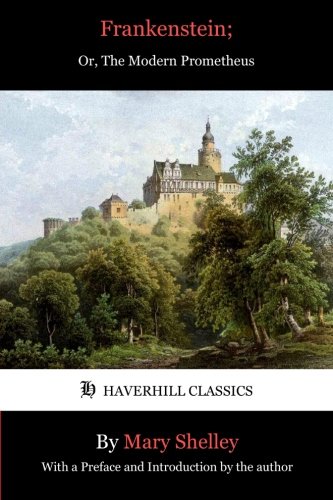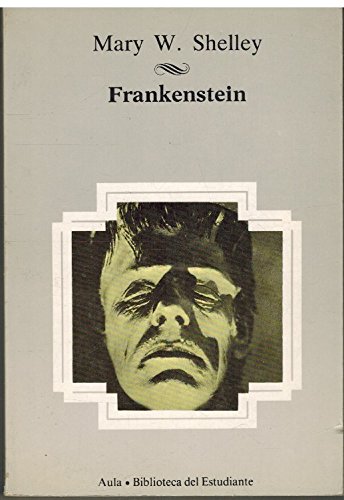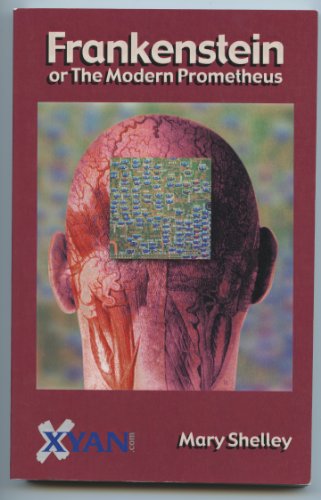-
Frankenstein: or, The Modern Prometheus
Mary Shelley
Paperback (CreateSpace Independent Publishing Platform, Aug. 14, 2015)Frankenstein; or, The Modern Prometheus, generally known as Frankenstein, is a novel written by the British author Mary Shelley. The title of the novel refers to a scientist, Victor Frankenstein, who learns how to create life and creates a being in the likeness of man, but larger than average and more powerful. In popular culture, people have tended to refer to the Creature as "Frankenstein", despite this being the name of the scientist. Frankenstein is a novel infused with some elements of the Gothic novel and the Romantic movement. It was also a warning against the "over-reaching" of modern man and the Industrial Revolution, alluded to in the novel's subtitle, The Modern Prometheus. The story has had an influence across literature and popular culture and spawned a complete genre of horror stories and films. It is arguably considered the first fully realized science fiction novel. Z+
Z+
-
Frankenstein; or, The Modern Prometheus
Mary Wollstonecraft Shelley
Paperback (Benediction Classics, Nov. 1, 2016)Mary Shelley’s Frankenstein is the world’s most famous Gothic novel and the first work of science fiction, with Frankenstein’s monster being a symbol of science gone awry. Shelley’s masterpiece has inspired numerous films, plays and other books. This, the 1818 edition, published anonymously, contains the author’s original vision. Later revisions, though edited by Mary Shelley, were made more conservative and palatable to nineteenth century readers.
-
Frankenstein or the Modern Prometheus
Mary Shelley
Hardcover (Simon & Brown, Sept. 11, 2018)None Z+
Z+
-
Frankenstein; or, The Modern Prometheus
Mary W. Shelley
Paperback (Hypothesis Press, May 5, 2018)Mary Shelley’s Frankenstein; or, The Modern Prometheus, tells the story of a scientist (Victor Frankenstein) who creates a grotesque but sapient creature. Frankenstein’s monster may not be the scariest component of the story; it also sheds light on a darker side of humanity. On one gloomy night in May, 1816, she, Percy Bysshe Shelley, Lord Byron, and others all promised to write a ghost story, prompting Mary Shelley to write this novel. She began the story at age 18, and it was first published when she was 20. Illustrations by Theodore von Holst.
-
Frankenstein, or, The Modern Prometheus Volume 1
Mary Wollstonecraft Shelley
Hardcover (Palala Press, Dec. 4, 2015)This work has been selected by scholars as being culturally important, and is part of the knowledge base of civilization as we know it. This work was reproduced from the original artifact, and remains as true to the original work as possible. Therefore, you will see the original copyright references, library stamps (as most of these works have been housed in our most important libraries around the world), and other notations in the work.This work is in the public domain in the United States of America, and possibly other nations. Within the United States, you may freely copy and distribute this work, as no entity (individual or corporate) has a copyright on the body of the work.As a reproduction of a historical artifact, this work may contain missing or blurred pages, poor pictures, errant marks, etc. Scholars believe, and we concur, that this work is important enough to be preserved, reproduced, and made generally available to the public. We appreciate your support of the preservation process, and thank you for being an important part of keeping this knowledge alive and relevant.
-
Frankenstein or the Modern Prometheus
Mary Wollstonecraft Shelley
Hardcover (Wisehouse Classics, Sept. 20, 2017)This is the Revised 1831 Edition of FRANKENSTEIN; OR, THE MODERN PROMETHEUS, a novel written by the English author Mary Wollstonecraft Shelley about the young science student Victor Frankenstein, who creates a grotesque but sentient creature in an unorthodox scientific experiment. Shelley started writing the story when she was eighteen, and the novel was published when she was twenty. The first edition was published anonymously in London in 1818. Shelley's name appears on the second edition, published in France in 1823. Shelley had travelled through Europe in 1814, journeying along the river Rhine in Germany with a stop in Gernsheim which is just 17 km away from Frankenstein Castle, where, two centuries before, an alchemist was engaged in experiments. Later, she travelled in the region of Geneva (Switzerland)-where much of the story takes place-and the topic of galvanism and other similar occult ideas were themes of conversation among her companions, particularly her lover and future husband, Percy Shelley. Mary, Percy, Lord Byron, and John Polidori decided to have a competition to see who could write the best horror story. After thinking for days, Shelley dreamt about a scientist who created life and was horrified by what he had made; her dream later evolved into the novel's story. Shelley completed her writing in May 1817, and Frankenstein; or, The Modern Prometheus was first published on 11 March 1818 by the small London publishing house of Lackington, Hughes, Harding, Mavor, & Jones. The second edition of Frankenstein was published on 11 August 1822 in two volumes (by G. and W. B. Whittaker) following the success of the stage play Presumption; or, the Fate of Frankenstein by Richard Brinsley Peake; this edition credited Mary Shelley as the author. On 31 October 1831, the first "popular" edition in one volume appeared, published by Henry Colburn & Richard Bentley. This edition was heavily revised by Mary Shelley, partially because of pressure to make the story more conservative, and included a new, longer preface by her, presenting a somewhat embellished version of the genesis of the story. This edition tends to be the one most widely read now, although editions containing the original 1818 text are still published. Many scholars prefer the 1818 text, arguing that it preserves the spirit of Shelley's original publication.
-
Frankenstein, or the Modern Prometheus.
Mary Wollstonecraft Shelley
Paperback (British Library, Historical Print Editions, March 25, 2011)Title: Frankenstein, or the Modern Prometheus. [By M. W. Shelley.]Publisher: British Library, Historical Print EditionsThe British Library is the national library of the United Kingdom. It is one of the world's largest research libraries holding over 150 million items in all known languages and formats: books, journals, newspapers, sound recordings, patents, maps, stamps, prints and much more. Its collections include around 14 million books, along with substantial additional collections of manuscripts and historical items dating back as far as 300 BC.The FICTION & PROSE LITERATURE collection includes books from the British Library digitised by Microsoft. The collection provides readers with a perspective of the world from some of the 18th and 19th century's most talented writers. Written for a range of audiences, these works are a treasure for any curious reader looking to see the world through the eyes of ages past. Beyond the main body of works the collection also includes song-books, comedy, and works of satire. ++++The below data was compiled from various identification fields in the bibliographic record of this title. This data is provided as an additional tool in helping to insure edition identification:++++<Source Library> British Library<Contributors> Shelley, Mary Wollstonecraft; <Original Pub Date> 1882.<Physical Description> 122 p. ; 8º.<Shelfmark> 12619.i.20.
-
Frankenstein: Or The Modern Prometheus
Caliber Press
Comic (Caliber Press, )None
-
Frankenstein: Or the Modern Prometheus
Mary Shelley
Paperback (CreateSpace Independent Publishing Platform, July 15, 2010)Frankenstein is a classic. Horror and mystery, wrapped up in the hubris of man taking on the role of God. Frankenstein also known as The Modern Prometheus, has something for everyone in that it's relatable and brings into play many emotion that are a part of the human condition. Although Frankenstein is still Science fiction modern medicine and science is getting close. What lessons can we learn that will come into play today? Dr. Victor Frankenstein creates a monster without regard for consequences. His temptation to play God is all consuming, and it over takes him. What are the consequences? Well I guess you should read this masterpiece and see what you learn from Frankenstein. Z+
Z+
-
Frankenstein: or, The modern Prometheus 1823
Kenneth Branagh Mary Shelley
Unknown Binding (Facsimile Publisher, March 15, 2013)Lang:- English, Pages 557. Reprinted in 2013 with the help of original edition published long back[1823]. This book is in black & white, Hardcover, sewing binding for longer life with Matt laminated multi-Colour Dust Cover, Printed on high quality Paper, re-sized as per Current standards, professionally processed without changing its contents. As these are old books, there may be some pages which are blur or missing or black spots. If it is multi volume set, then it is only single volume. We expect that you will understand our compulsion in these books. We found this book important for the readers who want to know more about our old treasure so we brought it back to the shelves. (Customisation is possible). Hope you will like it and give your comments and suggestions.Original Title:- Frankenstein: or, The modern Prometheus 1823 [Hardcover] Author:- Mary Shelley , Kenneth Branagh
-
Frankenstein; Or, The Modern Prometheus
Afterword) Shelley, Mary (Joyce Carol Oates, Barry Moser
Paperback (University of California, March 15, 1984)None
-
Frankenstein or the Modern Prometheus
Mary Shelly
Paperback (XYAN, March 15, 2000)The story of the monster created by Victor Frankenstein as the result of a scientific experiment and the havoc it caused has mesmerized generations of readers and inspired countless writers of horror and suspense. "Frankenstein" contains elements of the Gothic novel and the Romantic movement and is also considered to be one of the earliest examples of science fiction.